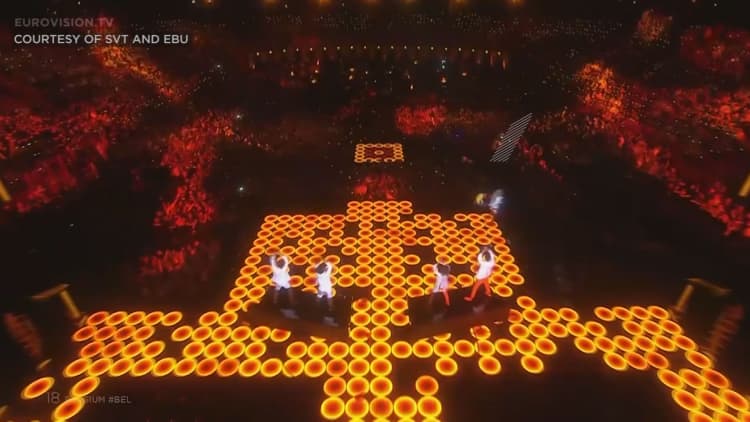
Aside from cheesy song lyrics, bold outfits and pyrotechnics, Eurovision is treasured, albeit sometimes ironically, by many Europeans and international music lovers for how it showcases the continent's cultural identities.
And in 2016, the U.S. has its own personal invitation to the contest's grand final.
Having secured a deal with Viacom's Logo Network, U.S. Eurovision enthusiasts can tune in to Logo this Saturday, May 14, to watch the broadcast live on TV, in all its brightly-colored glory.
But before you experience your first Eurovision, be warned; there's a lot more to this competition than just pop songs. CNBC breaks down the details.
The basics
When Eurovision began in May 1956, only seven countries participated. Its popularity has since grown within and beyond Europe's borders, with 42 countries—from Europe, the Middle East and even Australia—taking part in this year's competition.
Each year, nations put forward their contestants, with the majority having to compete in one of two semi-finals. A total of 46 active European Broadcasting Union (EBU) members can participate, while a maximum of 26 can take to the stage at the final.
The host country, along with the so-called "Big Five"—Spain, Italy, Germany, France and the U.K.—already secure a place for each final, due to their financial contributions to the EBU.
With almost 200 million tuning in to 2015's entire contest, international publicity and popularity is a great prize—along with the trophy—for each winner. Even with this career boost, only a handful—like ABBA and Celine Dion—have managed to achieve long-lasting global success after the contest.
Leave politics at the door?
Eurovision may strictly prohibit politics, but it somehow seems to find its way into the competition. For 2016, Eurovision's "Come Together" theme hopes to promote unity, yet topics such as the refugee crisis and Russia could impact this.
Russia's entry, Sergey Lazarev with "You are the only one" is seen as one of 2016's favorites, like last's year's runner-up, Polina Gagarina. However, tensions are known to arise, with "anti-booing" technology reportedly put in place in 2015, to mask any potential jeering during Gagarina's performance.
Ukraine's Jamala is singing "1944", which is believed to be about Stalin's mass deportation of the Tatars and incorporates a phrase about building a "future where people are free to live and love"; a song that has sparked controversy in Russia.
"Because of the strong showing of Russia and Ukraine, the most clear political lineage is the question of how to handle Russia and its relationship to Europe," Robert Deam Tobin, Henry J Leir Chair in language literature and culture at Clark University, told CNBC via email.
"The refugee crisis is there a little more subtly, in the form of strong appeals to multiculturalism in many of the performances (as indicated by France and Germany, for instance). Brexit is, perhaps surprisingly, not explicitly there, but the hope for a unified Europe undergirds the competition," Tobin added.
Voting patterns are also common, with one 2014 study suggesting four voting groups tend to emerge: Southern and Central Europe; Switzerland, Austria and former Yugoslavia countries; and one broader group including the former Soviet bloc, Ireland, the U.K., and Scandinavia; which researchers suggested would often break up into two smaller random clusters annually.
The study by UCL and Imperial College London suggested there was "no convincing evidence of negative bias or discrimination", when it comes to voting.
Voting shake-up
In previous years, scores from both a country's televoters and jury were delivered as a combined result, making it easy to predict front-runners early on. In 2016 however, votes will be split to improve transparency.
Firstly, each national judging panel awards points to their top 10 favorite contestants, followed by each country giving their own separate set. All TV votes—from all nations—will then be combined, calculated and announced, starting with the act that was given the least amount of points.
Points-wise, each country awards their favorite 10 acts with scores of 1 to 8, followed by 10 and 12. Each country cannot vote for its own contestant.
Eurovision final: When? Who to watch? And how to celebrate?
While European broadcasters and long-term fans—in places like China, Kazakhstan and New Zealand—will have their own designated channels; U.S. citizens can view the 61st Grand Final on Logo at 15.00 p.m. EST, as well as on Logo's website and mobile app.
Aside from Russia and Ukraine's entries, other contestants garnering attention include Germany's Jamie-Lee Kriewitz with her colorful Manga style; France's Amir with his fresh pop, dance anthem "J'ai cherché"; and Sweden's 2016 singer Frans, after the country won in 2015, with Måns Zelmerlöw's hit "Heroes".
In addition, Justin Timberlake will be performing his new single "Can't stop the feeling" during the final's interval.
Aside from official celebrations running up to the event, Eurovision parties are popular among loyal fans. While a home-made party differs from place to place, common features include fancy dress (country stereotypes); sweepstakes; drinking games; and a mix of international cuisines.
Haven't got TV access? Never fear. Eurovision's own website and its YouTube channel will be live-streaming the final, when it commences in Stockholm, at 9:00 p.m CEST on May 14.




